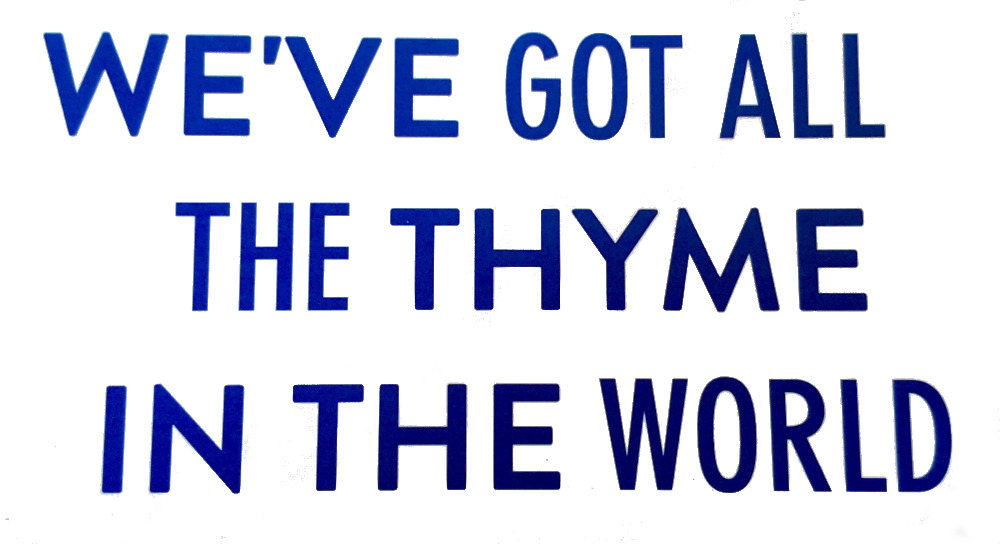All the thyme in the world
« previous post | next post »
A small recent experience with herb-related synchronicity reminded me of some very interesting phonetics research.
 This all began a couple of weeks ago, when Larry Hyman and I were discussing what seasonings to use on meat to be grilled for dinner. I suggested thyme, and Larry reminded me of Suzanne Gahl's 2008 paper "Time and Thyme Are not Homophones: The Effect of Lemma Frequency on Word Durations in Spontaneous Speech":
This all began a couple of weeks ago, when Larry Hyman and I were discussing what seasonings to use on meat to be grilled for dinner. I suggested thyme, and Larry reminded me of Suzanne Gahl's 2008 paper "Time and Thyme Are not Homophones: The Effect of Lemma Frequency on Word Durations in Spontaneous Speech":
Frequent words tend to shorten. But do homophone pairs, such as time and thyme, shorten equally if one member of the pair is frequent? This study reports an analysis of roughly 90,000 tokens of homophones in the Switchboard corpus of American English telephone conversations, in which it was found that high-frequency words like time are significantly shorter than their low-frequency homophones like thyme. The effect of lemma frequency persisted when local speaking rate, predictability from neighboring words, position relative to pauses, syntactic category, and orthographic regularity were brought under statistical control. These findings have theoretical implications for the locus of frequency information in linguistic competence and in models of language production, and for the role of articulatory routinization in shortening.
As it happened, I had run out of thyme shortly before leaving for California, and being pressed for time, I quickly logged on to amazon.com and ordered some, counting on delivery by the time I got back. When I opened the package after returning to Philadelphia, I learned that I had failed to notice the amount, or at least failed to recognize that 16 oz. is quite a lot of thyme, at least compared to the 0.65 oz. that turns out to be the standard quantity in the little bottles you buy at the store:
 |
 |
(Storing the delivery pretty much used up my available containers, as shown in the picture. Apparently the 16-oz. package is meant for people who use it to make tea. And interestingly, the cost of the two purchases was similar.)
Anyhow, a couple of days later, some of us tried out a new restaurant in Philadelphia, The Love — which was pretty good — and on their check-out table they had postcards (really — postcards?) featuring in bright blue text "WE'VE GOT ALL THE THYME IN THE WORLD".
And getting back to the phonetics, Suzanne Gahl's thyme/time article reminded me of a fascinating line of research on recency effects in speech production, begun about 20 years ago by Ellen Bard and others. (There's no herbal connection this time, though.) Two of the papers:
Ellen Bard & Matthew Aylett, "The dissociation of deaccenting, givenness, and syntactic role in spontaneous speech", ICPhS 1999:
This study examines co-referential repetitions in task-oriented dialogue for characteristics conducive to the lowered clarity of words naming Given entities. Pairs of word tokens repeatedly mentioning the same entity within a single task-oriented dialogue (n=294) and pairs introducing an entity in separate dialogues (n=48) were compared. In both samples intelligibility and length fell significantly with repeated mention. Deaccented second mentions, thought to be largely responsible for this effect, were rare (15% within, 6% between dialogues) and did not account for effects of repetition. Repetitions within sentences of the same structure are thought to encourage deaccenting, but were not common (6%, 35%), and structural similarity did not encourage deaccenting. Similarity in the conversational role of carrier utterances was associated with higher rates of similar structure among re-introductions, but not with increased frequency of deaccenting. Thus, factors which should promote marking of Givenness are either lacking or ineffective.
Ellen Bard et al., "Controlling the Intelligibility of Referring Expressions in Dialogue", Journal of Memory and Language 2000:
If speakers articulate clearly enough to meet the perceptual needs of their listeners, clarity should depend on what listeners know about (listener-Given) rather than on what speakers know about (speaker-Given). For words excerpted from spontaneous speech, however, intelligibility to naive adult listeners showed only effects of the speaker’s knowledge. Words introducing labeled map landmarks to two successive listeners were less clear on repetition even though the second listener had not heard the original mention (Experiment 1). Repeated mentions became less clear even after the listener reported inability to see the landmark (Experiment 2). Speakers were affected by what they had heard listeners mention: Intelligibility fell equally in coreferential repetitions across and within speakers (Experiment 3), whether or not the repeater could see the referent (Experiment 4). The results are explained via fast priming processes dependent on the speaker’s knowledge and slow, optional processes drawing inferences about the listener’s.
One conclusion seems to be that frequency and recency effects, though generally a help to efficient communication, are less controlled by "audience design" than one might think, and more influenced by the speaker's own history.
I should add a link to an article in the most recent issue of Language — Arne Lohmann, "Time and thyme are NOT homophones>A closer look at Gahl’s work on the lemma-frequency effect, including a reanalysis":
‘Time and thyme are not homophones’, a 2008 article by Susanne Gahl published in Language, reports a frequency effect differentiating the durations of homophones, for example, time vs. thyme. The article is of fundamental theoretical relevance, as the finding reported has significant implications for research on homophones and the effects of frequency in general. As I show in the present paper, however, the main analysis in Gahl 2008 does not provide quantitative evidence for the effect. The same is true of a follow-up study (Gahl 2009). I provide here a reanalysis based on the original data set, which shows that the frequency effect reported in the original article is real.
The fact that Gahl's analysis was based on a published dataset was crucial in allowing Lohmann to take another look at it — and in this case, the result was to confirm and extend the original conclusion:
This paper has demonstrated that the main analyses in Gahl 2008, 2009, although widely cited as doing so, do not provide explicit evidence for a durational difference between homophones that is contingent on differences in frequency. A reanalysis of the data Gahl collected, however, does provide evidence for this effect. In conclusion, the theoretical implications regarding the lexical representation of homophones, extensively discussed in Gahl 2008 and numerous papers citing it, still stand. Furthermore, the same reanalysis carried out on a sample of homographic noun-verb conversion homophones provides further evidence for the lemma-frequency effect, a finding discussed in detail in Lohmann 2017. The latter result suggests that the frequency effect on homophone duration is not contingent on differences in spelling.
Jarek Weckwerth said,
August 10, 2018 @ 9:49 am
This makes me think of human PA announcements (e.g. on public transport, or in supermarkets, etc.) that become so routine for the driver (etc.) that a "naive" listener has zero chance of understanding the first repetition.
Tom S. Fox said,
August 10, 2018 @ 9:51 am
Let’s not forget that Mussolini made the trains run on thyme.
Philip Taylor said,
August 10, 2018 @ 9:54 am
More than a little OT, but I cannot but help recall the time (many years ago) when I played "THYMES" in Scrabble and was told by my opponents that TYHME cannot take a plural. I argued that since over 400 varieties of thyme are known to exist, "of course" THYME can take a plural. In the end I had to make a long-distance telephone call to someone with OED access before I was allowed to claim the points …
AntC said,
August 10, 2018 @ 10:30 am
Thanks Mark. I'm confused. (Also not sure I want to release my contact details to 'Muse' and certain I don't want to to 'DeepDyve'.)
[(myl) Gahl 2008 is available without any Dyving on her Berkeley page. Unfortunately Lohmann's reanalysis does not seem to be posted anywhere else yet, though I'd be happy to send you a copy if you like.]
Lohmann is saying that Gahl's original data/the Switchboard corpus does support the 2008 paper's 'finding'. But that the original finding was not correctly founded on the data?
Is Lohmann saying that Gahl's use of statistics/correlation was invalid? Perhaps there's not as high a degree of correlation as claimed?
If Gahl was wrong, I don't understand why; and I don't understand what difference it makes.
[(myl) Basically Lohmann is saying that Gahl's statistical analysis, though not mistaken, was not adequate to establish her conclusions; but that his reanalysis, based on the same data, is. This makes no difference at all if you only care about the conclusions — but for people interested in applying similar methods to related problems, the issues are worth working through.]
My takeaway is there's no such thing as a genuine homophone.
[(myl) That's true and not true. On the "not true" side, the first thing to keep in mind is that these differences in duration are facts about distributions of measurements that are also affected by a very large number of other factors, like phrasal position, overall speaking rate, individual speaker characteristics, and so on; so the ability to select e.g. thyme vs. time on the basis of a single production is negligible. And though none of these papers test it, I'd also predict that there would be no reliable differences in the production of isolated citation forms. So it remains valid to say that the claims that a word makes on sound are encoded in its (discrete, digital) phonological representation, and that "homophones" have the same phonological representations.
On the "true" side, the point is that among the large number of non-phonological factors influencing the phonetic details of speech production on particular occasions are things that are correlated with lexical identity: frequency, recency, formality, register and style, emphasis, etc.]
mistah charley, ph.d. said,
August 10, 2018 @ 11:20 am
not relevant to the herb, but a perennial favorite
time flies like an arrow
fruit flies like a banana
J.W. Brewer said,
August 10, 2018 @ 12:00 pm
The "all the thyme in the world" bit makes me wonder if there would be any scholarly benefit other than sheer amusement in compiling a list of the X most common fixed-phrases/idioms/cliches including the word "time" and seeing how many of them also exist out there on the internet with "thyme" swapped in. I am pleased to discover that the cultural influence of the Chambers Brothers is still strong enough that googling reveals multiple instances of "thyme has come today."
Electric Dragon said,
August 10, 2018 @ 1:29 pm
"Apparently the 16-oz. package is meant for people who use it to make tea."
So, that would be for tea-thyme then?
Mick O said,
August 10, 2018 @ 1:42 pm
@J.W. Brewer
I was delighted to see that a search for "ain't nobody got thyme for that" triggered a suggestion from Google that "ain't nobody got thyme for that cross stitch" is a big hit.
Robert Coren said,
August 10, 2018 @ 4:12 pm
@J. W. Brewer: If we're going to stick to amusement value, as a gardener and a musician, I am pleased to note that my garden contains, among other things, 4/4 (i.e., common thyme), but when I harvest it for kitchen use it becomes 2/2 (cut time).
Oh, and when I weed in its vicinity, I will often discover that I have thyme on my hands.
David Morris said,
August 10, 2018 @ 4:21 pm
So you'll tell your next house guests 'Take all the thyme you need'?
[(myl) Absolutely. And a good thyme will be had by all.]
chris said,
August 10, 2018 @ 8:58 pm
To everything there is a seasoning, and a thyme for every purpose under heaven. But is yours a thyme to love, or a thyme to hate? A thyme to keep, or a thyme to cast away?
Daniel Hill said,
August 11, 2018 @ 12:05 am
"Apparently the 16-oz. package is meant for people who use it to make tea."
Or Lebanese like my wife (and other middle easterners). Mix it with sesame seeds, sumac, and olive oil to make a spread called zaatar, which is the Arabic word for thyme (but not time).
David Marjanović said,
August 11, 2018 @ 3:48 am
That's ingenious.
Philip Taylor said,
August 11, 2018 @ 4:57 am
More than merely "ingenious", I would say. I'm still smiling after reading it, and thinking that this thread has surely demonstrated that there is a thyme to every purpose under Heaven.
[(myl) Also perhaps that Eternity is in love with the productions of Thyme.
Gregory Kusnick said,
August 11, 2018 @ 10:39 am
Let's not forget Nero Wolfe and his wild thyme honey.
Anne Cutler said,
August 11, 2018 @ 9:51 pm
who knew that deep in Llog this thyme bomb was waiting to go off…
Philip Taylor said,
August 12, 2018 @ 5:28 am
So if I were to measure the length of various utterances of "Mondegreen", would I be an eggcorn-thymer ?
Ran Ari-Gur said,
August 12, 2018 @ 2:10 pm
> In both samples intelligibility and length fell significantly with repeated mention.
I wonder if the same is true with word parts? For example, there are a lot of relatively common, relatively uninformative endings like English -ation, Spanish -amos, Hebrew -im, etc., that (usually) carry the word stress. When such an ending appears many times in an utterance, does it get shorter or less intelligible after repeated uses, even though it's still stressed? (And if so, does that affect the rest of the word at all?)
John Swindle said,
August 12, 2018 @ 3:25 pm
The duet "Bide Thy Thyme," from P. D. Q. Bach's oratorio "The Seasonings," comes to mind. Fortunately for the piece, but unfortunately for the linguistic question, any thyme/time distinction is lost because the music sets the pace.
BobbieZ said,
August 12, 2018 @ 10:51 pm
If you were in the club house on the golf course, it would be thyme-tea tea thyme tee thyme.